
The act of writing computer code using programming languages is referred to as coding. The websites, apps, and other technology we use daily are programmed using computer code. But what exactly is coding, and why is it crucial?
The terms “code” and “programming” are familiar to most people, both inside and outside the computer community. Coding proficiency is necessary for many of the finest tech jobs. Understanding and deciphering code is essential to work in a rewarding region like programming, web improvement, or information science. Assuming you’re thinking about what coding implies, continue to peruse to learn.
What Do You Mean by Coding?
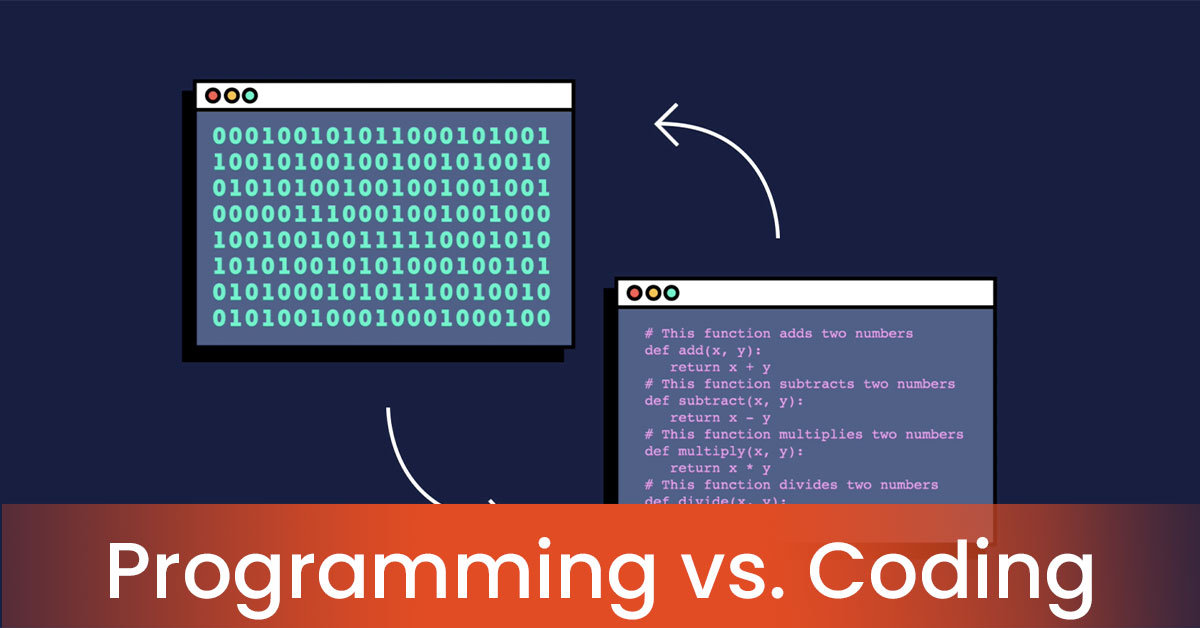
Computer coding is the process of using computer programming languages to create a set of instructions for machines and computers to follow. Humans communicate with devices through coding. Thanks to it, we can develop operating systems, programs, and mobile applications.
What is the Purpose of Computer Code?

Computer communication is done through coding. Coding is how humans instruct computers and other devices on what to do. The websites, applications, and other daily technologies are programmed using computer code. Though it might seem easy, how does coding function?
How Does Coding Function?

Coding functions by writing instructions in a language that computers can comprehend and carry out. Transistors, which are straightforward solid-state, on-and-off switches, are used to build computers, which are electronic devices. Let’s say that a computer is created by connecting tens of thousands of these on/off switches.
In short words, this is how coding operates: These switches receive instructions in binary code, commonly known as 1s and 0s, to turn on (1) or off. A transistor will either receive a one or a 0 and since thousands of them are working simultaneously, a computer can carry out a wide range of operations.
Unfortunately, it would take a very long time to hand-type a number for each transistor to make an entire computer work. As a result, engineers created high-level languages to facilitate process acceleration. We address entire portions of transistors to carry out a given task instead of managing individual transistors with machine code.
What Is the Use of Coding?

Website and software development is only a couple of the many uses for computer code. The tremendous technological development in recent decades has profoundly impacted how everything functions. You must go beneath the surface to see where the most significant changes occurred.
Computers replaced analog machine warehouses and millions of hours of labor with quicker, safer, and more dependable alternatives. It is understandable why code is everywhere since computers depend on it to function. Code will become more prevalent in our daily lives as computers continue supplanting technology from microwaves to power plants.
Why is coding so crucial?

Coding is significant because it forms the foundation of contemporary software and applications. Some of the digital technologies we use today and significantly simplify our lives, like the payment app Venmo or the ride-hailing service Uber, would not be possible without coding.
Viewing this article on a website wouldn’t be feasible without coding since it is also necessary for web creation. Every business needs coders, from marketing to data analysis and insurance to banking. The creation of the digital systems that underpin these sectors is made feasible through coding.
The advantages of coding are numerous. You can get a variety of well-paying careers in any field of your choice if you learn to code. Coding will continue to be crucial for the future because apps and software programs power modern culture. According to the Bureau of Labor Statistics (BLS), employment opportunities in software development will increase by 22%. This implies that your job security will probably be very high if you learn to code.
Here are some benefits of learning to code are:
● Coding is highly sought-after expertise that will help you find employment security and open many professional doors.
● Employers place a high value on coding abilities and are prepared to pay top cash for candidates fluent in popular programming languages like Java, Python, and JavaScript.
● Even just learning to code is a difficult task that will test your tenacity and willpower.
● Your aptitude for math and problem-solving is strengthened by learning to code.
What Distinguishes Coding and Programming from Each Other?

Coding is distinct from programming because it relates to the highly particular task of writing code that computers can understand. On the other hand, the term “programming” denotes a broader range of procedures that enable the creation of complex systems.
In other words, programming is a component of coding rather than the other way around. Coding is a relatively specific activity, but programming is a high-level process. Coding can be viewed as a crucial step in the programming process.
Why Do We Code?

Coding is the process of converting spoken instructions into a machine-understandable form. Only a code editor like Notepad is required to do this highly specialized activity.
How Do You Program?

A technique used to create sophisticated digital systems is programming. One must do more than just write code to make a logical answer to a problem. Programming encompasses topics like data structures and algorithms, contrary to conventional conceptions of “code.” It necessitates a broader range of tools, such as team management, design, and testing software.
Programming vs. Coding
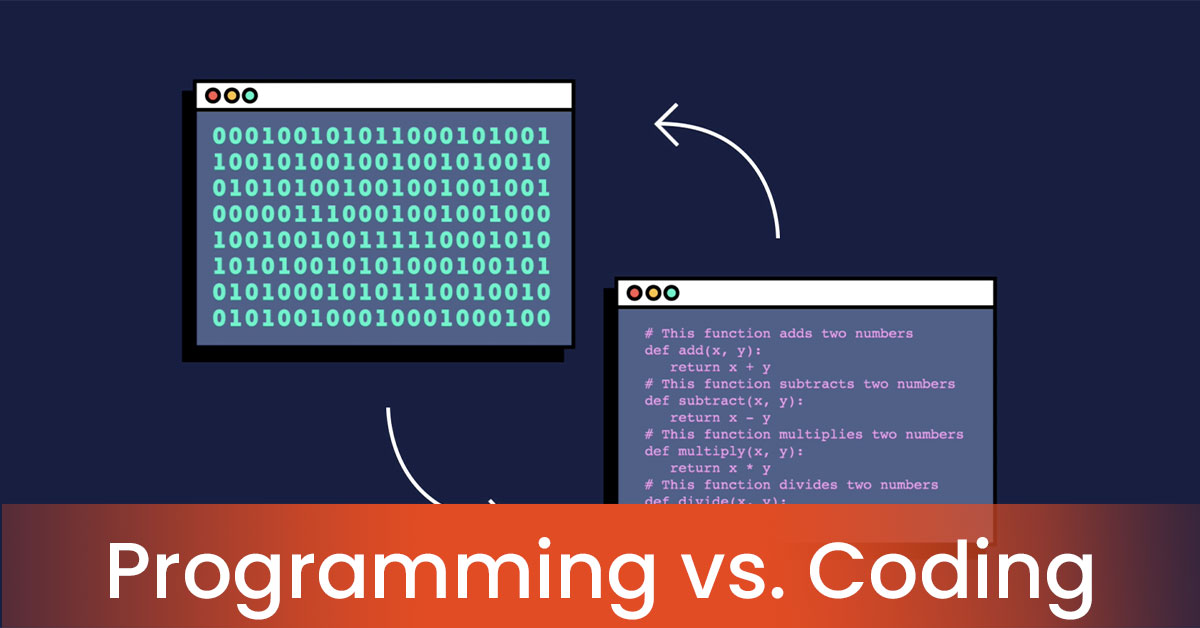
Code is a subset of programming. Another saying is that programming “contains” coding. Continue reading to learn more about what we mean exactly when we say “code,” as the distinction between programming and “coding” is subtle and can be challenging to understand.
Programming Languages: What Are They?

Programming language regulations outline coding conventions. These rules bring computer language and human language closer together. It’s simple to see them as computer-friendly languages. Websites, programs, and computer systems are all created using computer languages.
Programming uses a wide variety of coding languages. Programmers and coders frequently select one computer language over another based on the language’s uses, popularity in a particular industry, or suitability for a given project.
The top 10 programming languages are listed below. We demonstrate their widespread uses, the businesses now utilizing them, and how difficult they are for total newbies.
How many different coding languages exist?
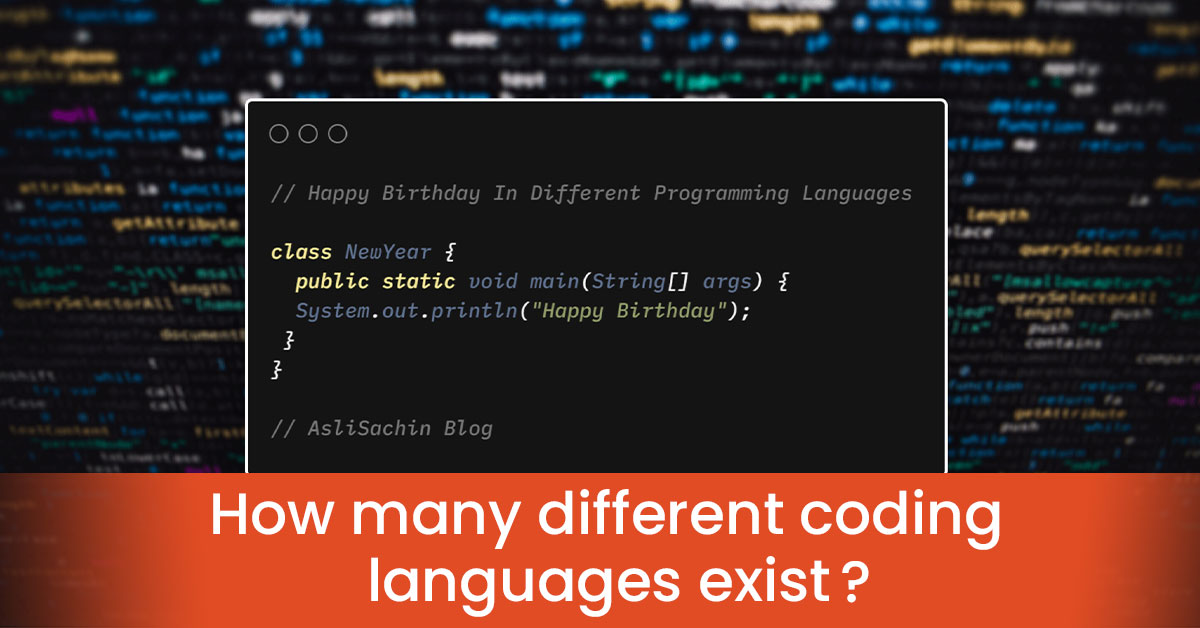
The TIOBE Index indicates that 274 specified coding languages exist. The number of coding languages is substantially higher according to various sources than the list, based on a language’s function and notoriety. Countless programming languages aren’t used frequently enough to be noteworthy because anyone can design them.
We may look to GitHub, a well-known software development platform, to obtain a reasonable estimate of the number of coding languages that are actually in use. The most popular languages on this site are JavaScript, Python, and Java, making up over 300 open-source projects.
Why Are Programming Languages Special?

Programming languages differ from one another due to their features and functions. Despite being relatively simple, many programming languages have different functions. For example, one of the most widely used languages, JavaScript, is primarily utilized for front-end development and websites. On the other hand, Python is used in both complete software applications and websites.
Given that multiple programming languages may frequently do the same task, the choice of language is typically left up to the software developer. Most individuals select a language that strikes a balance between usability and functionality.
Languages for Programming at Different Levels
Programming languages can be divided into many different categories. The degree of a language is one of the main categories. High-level languages are like human languages, while low-level languages are like binary code. A high-level language usually makes learning to code easier, whereas low-level languages give you more creative freedom.
What Are the Easiest Coding Languages to Learn?
HTML, CSS, and JavaScript are the most simple to learn languages. These programming languages are the foundation for web development. Hence it is impossible to overstate their importance.
Most courses and programs in web development start with HTML, which enables you to organize web pages. They continue with CSS, a computer language used to format and style web pages. The most complicated of these three computer languages, JavaScript, is solely focused on creating interactive websites.
What Coding Language Is the Most Difficult to Learn?

Although many others exist, C++ is the most challenging programming language to learn. Due to its sophisticated syntax and versatility, which enables programmers to create almost anything technically conceivable, C++ is one of the most complex coding languages to master.
Prolog, LISP, Haskell, and Malbolge are the other coding languages most difficult to master. These programming languages are challenging. Therefore it’s recommended to explore them if you have some coding expertise. For instance, if you are already familiar with the C programming language, learning C++ will be considerably more straightforward.
What Coding Language Is Most Popular?
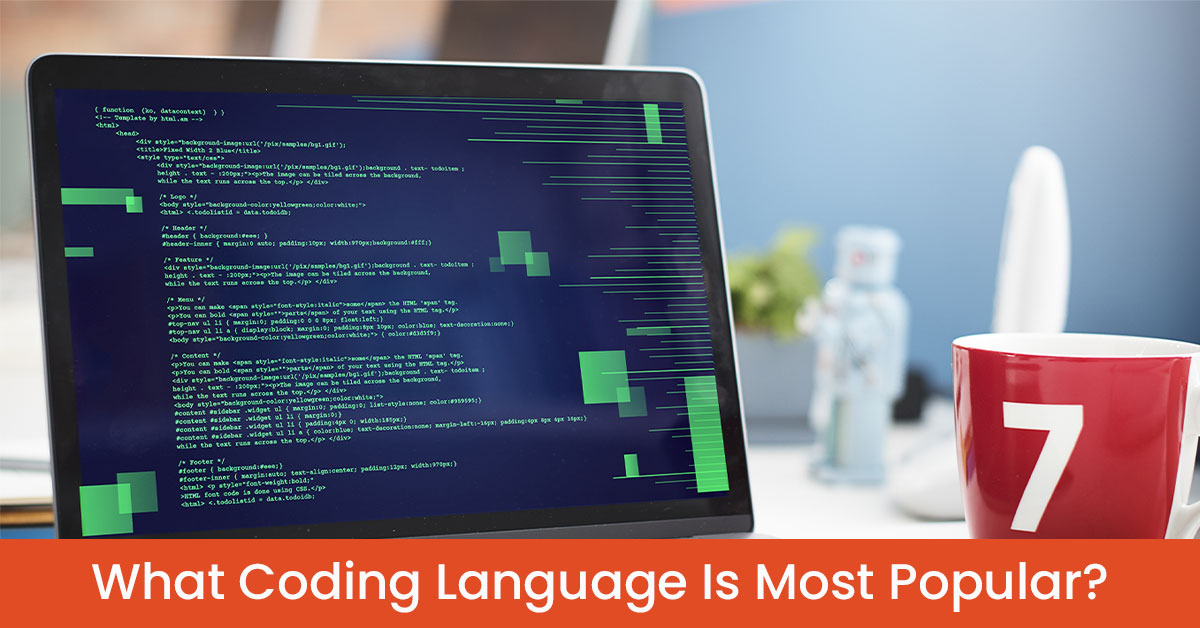
The well-known computing hub and informational portal Stack Overflow claims that JavaScript is the most widely used coding language. According to its report from 2021, JavaScript is used by 69 percent of professional developers. Another popular coding language is HTML/CSS, operated by 56% of professionals, and SQL, used by 51% of professionals. Node.js, Python, and TypeScript. Js are also mentioned.
Is Learning Coding Difficult?

No, learning to code is not difficult. Both coding and coding-related learning resources are widely available. Because of this, learning to code has become simple. Learning programming languages typically takes three to six months for the average person. Attending coding bootcamps, which provide quick yet intensive training, is usually a way to achieve this.
How Do Computer Programs Work?
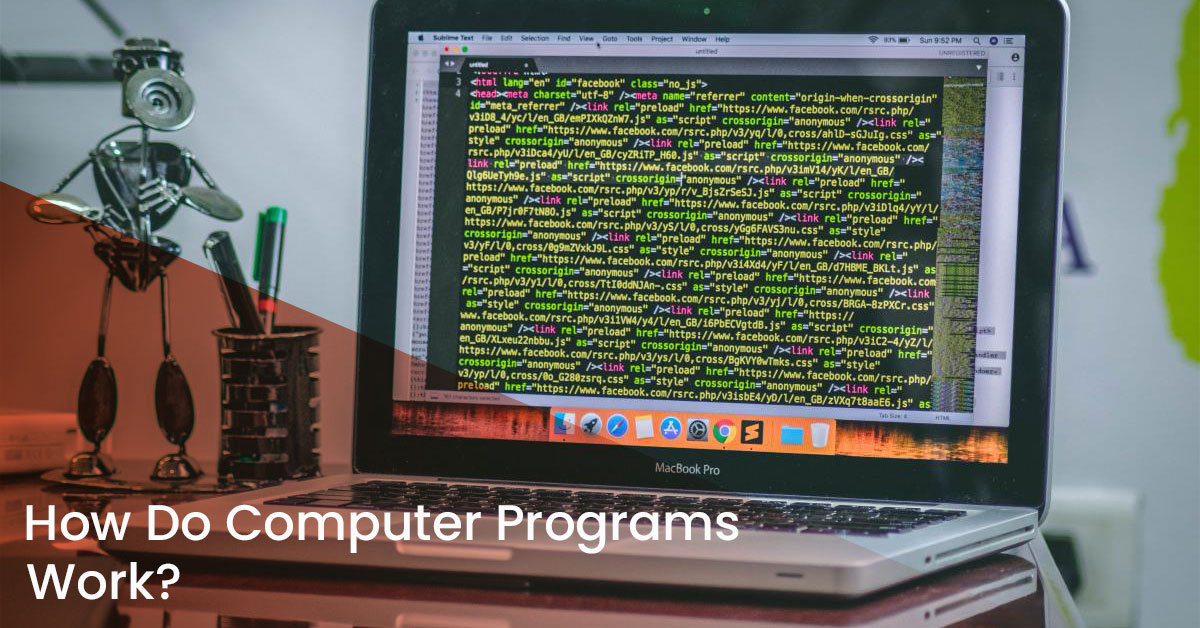
Text files used as a computer’s manual of operations are known as computer programs. You instruct the computer to read a text file and perform the commands when you launch an application. Computer programmers use different programming languages to build software.
A system can quickly scan many instructions depending on the computer’s processing speed. A human couldn’t process thousands of lines of code as soon as a machine and decide which actions to take.
What is Coding Is an Algorithm?
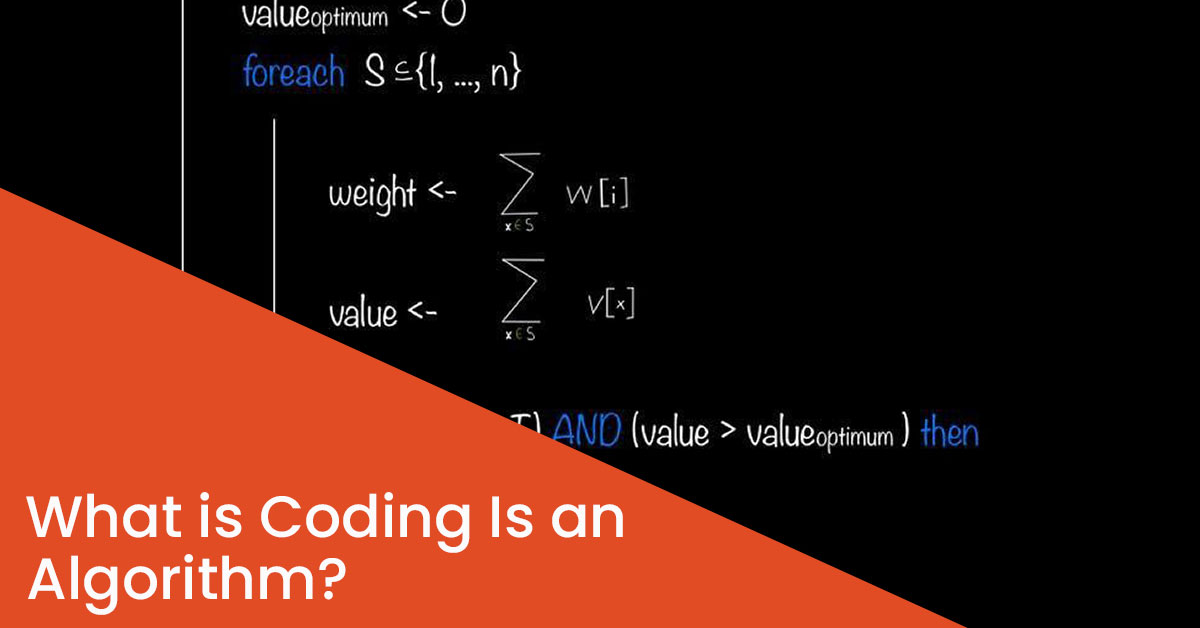
In computer programming, an algorithm is a collection of guidelines that uses inputs to produce an output. A technique outlining the specific steps required to resolve a problem or accomplish another objective is sometimes called an algorithm in the context of coding.
If your list has a lot of things, you can use an algorithm to find a particular item, sort the list, or add new items. Algorithms are widely used today. You utilize an algorithm every time you use your phone to place a meal order or your computer to perform a Google search.
● Consider an algorithm for the cooking recipe: you begin with the elements (input), follow the steps (process), and finish up with a tasty pie, soup, or another dish. To qualify as an algorithm, a system of requirements must be satisfied. Here is some algorithm that has the following characteristics:
● Clear. A coding algorithm should be transparent, simply providing each step without space for misunderstanding or error.
● Simple. An algorithm ought to be as simple as feasible. It should have a start, center, and end. The secret is just to include what is required.
● Language-independent. According to the programmer, the algorithm should work with any programming language.
Digital devices use coding, including phones, calculators, laptops, and smart TVs. While practically every area of modern life depends on coding, computer science deals with high-level theoretical concepts. It is used in almost every new car to regulate everything from fuel injectors to air conditioning systems. Cities use computers to run their traffic lights.
Computerized systems have expedited processes that were once analog. This enables engineers to create a machine, building, or system that is more effective and less expensive. Coding is also used in some of the most cutting-edge technical disciplines, like artificial intelligence and machine learning.
How to Get Started With Coding

Your alternatives for learning to code these days are essentially endless. According to the Bureau of Labor Statistics, most computer programmers have bachelor’s degrees. Some organizations, though, are willing to hire programmers with different degrees or expertise in particular programming languages.
There are many ways to begin learning to code, including enrolling in a coding boot camp, practicing using a coding app, and signing up for a free online course. Here are some of the top methods for learning to code below.
Websites that code

There are an incredible number of websites where you may practice and learn computer coding. You can learn programming skills, for instance, via websites like Treehouse. Or perhaps you would like text-based lessons, like those from W3Schools. You can learn the fundamentals of coding and gain familiarity with your preferred computer language with the help of these and similar resources.
Coder Apps
Learning to code is portable and enjoyable with the most outstanding coding applications. Numerous mobile apps enable you to perform exercises and hone your programming abilities. Among the most well-liked coding apps are:
● Enki
● Codehub
● Programming Hub
● Grasshopper
● Encode
● Programming Hero
Coding Bootcamps
One of the best coding bootcamps is a fantastic alternative if you’re serious about learning to program. A Bootcamp is a brief course of study with a curriculum focused on real-world applications. There are many opportunities to put your new skills into practice, as well as knowledgeable instructors. The following list contains some of the top coding bootcamps.
● Flatiron School
● Thinkful
● Kenzie Academy
● Springboard
● General Assembly
● CareerFoundry
● Lambda School
● BrainStation
● Emonics Academy
Diploma Programs
The conventional path of earning a bachelor’s degree may be the best method to begin a career in coding. According to Stack Overflow’s 2021 Developers Survey, 80% of professional software developers have finished a higher school program. Employers prefer software engineers with at least some undergraduate education.
Most would-be developers and programmers opt to earn a bachelor’s degree in computer science or a related subject, like mathematics. They are taught the fundamentals of the craft at school, including how to write code, test programs, and solve issues.
Self-Guided
Learning computer code online on your schedule is a perfectly viable option. In actuality, many skilled programmers have self-taught backgrounds. The easiest method to learn how to code independently is to become familiar with the plethora of online materials, pick a few that suit your needs, and work on them daily.
We advise looking at Hackr.io, freeCodeCamp, and Stack Overflow if you’re searching for a means to start learning to code without enrolling in a course or program of study. After you’ve mastered the fundamentals, you may use GitHub to work with other aspiring programmers, upload your projects, and get advice from seasoned experts.
How to Get Free Coding Training

It’s simple to pick up coding skills today. The Internet presents a wealth of resources for those who want to become computer programmers or software developers. Many of these learning sites can be accessed for free, even though some, like coding bootcamps and online courses, can be expensive.
Sites with at least a few free coding lessons and other cost-free learning materials are included in the list below. With these websites, learning to code for free is straightforward. You can learn how to, among other things, design your website, an algorithm to organize data, or even a simple app.
These are the most effective sites to learn to code for free:
● Udemy
● SoloLearn
● Coursera
● Khan Academy
● Codecademy
● The Odin Project
● Skillcrush
What Is the Learning Curve for Coding?

Learning to code can take three to four years, depending on the method used. For instance, if you enroll in a coding boot camp, it won’t take more than three months to master at least one coding language. On the other hand, those who choose a bachelor’s degree often finish their degrees in four years.
However, many alternatives exist, such as self-studying with cost-free online resources or joining a MOOC. Whichever path you take, if you put in the effort and keep your attention, you can learn the fundamentals of any coding language in as little as three months. You can see in the table below how long it typically takes to learn to code using various methods:
Learning Method:
- Average Time to Learn Coding
- Self-study
- Six months
- Coding Bootcamp
- Six months
- College Degree
- Four years
A Coding Class: What Is It?

You can learn to code in short-term courses called coding classes. Taking a coding class is an excellent alternative if you want to upskill or learn some basic coding ideas. The best aspect is that there are numerous free classes where you can learn the basics of coding. Most of these are available as online courses.
Is Coding a Good Profession?

Yes, a career in coding is an excellent choice for a job. Using your coding skills, you can work as a computer programmer, software developer, software engineer, or cyber security specialist. These careers pay significantly more than the average salary in the country; hence selecting coding as a career is an excellent financial investment.
According to data from the Bureau of Labor Statistics, a profession in coding has a very high degree of job security. This organization predicts that between 2020 and 2030, there will be a 22 percent increase in the number of available employment for software developers. The job picture for information security specialists is even more promising, with a 33 percent predicted increase in vacant positions.
A profession in coding is also rewarding. Your proficiency in coding will put you in a hectic office setting where you can work alongside motivated coworkers. A career in coding is also a fantastic choice because it requires constant attention to detail. To stay current with technology, you’ll need to study regularly to keep your mind fresh and awake.
Careers in Coding: A Closer Look

Various coding career routes, such as product manager, cyber security engineer, and data scientist, are accessible to those with programming expertise. We examine some of the highest-paying coding career opportunities in detail below. We outline each career’s key responsibilities and the programming languages needed.
Product Manager
● Highest-Paying States: New Jersey, New York, Colorado
● Programming Languages: Ruby, C#, Python, Java
As a product manager, you will take charge of a specific digital product and see that it is launched and received favorably. You’ll decide what success looks like and make the more important choices that will guide your group toward it. Although coding knowledge is not a prerequisite in and of itself, having it will help you comprehend the product and the effort needed to make it stand out from the competitors.
Data Scientist
● Highest-Paying States: Washington, California, Delaware
● Programming Languages: Python, JavaScript, R, C++, SQL
It takes programming language proficiency to succeed as a data scientist. These experts design algorithms, as well as clean and sort data, using their understanding of coding. Although different businesses have varying language requirements, Python, R, Java, and Scala are frequently employed in this coding career path.
Game Developer
● Highest-Paying States: California, Washington, Maryland
● Programming Languages: C#, C++, Java, JavaScript, Python
The duties of a game developer might range from creating appealing character designs to selecting moody sound effects. The job description may also include writing the code that serves as the game’s framework. If so, you’ll probably need to be familiar with C++ or C#, the two most popular languages used in the game creation industry.
Cyber Security Engineer
● Highest-Paying States: California, New York, Maryland
● Programming Languages: C, C++, Python, PHP, SQL
A rapidly expanding job field in coding is cyber security. You must acquire at least one programming language to become a cyber security engineer and become a master of the craft of defending computer systems from online attacks. C++, Python, and other programming languages are frequently used in this area.
UI/UX Designer
● Highest-Paying States: Washington, California, Georgia
● Programming Languages: Python, Ruby, JavaScript
User interface (UI) and user experience (UX) design have recently become increasingly popular. A UX or UI design expert ensures that the final product is as user-friendly as feasible. It calls for a range of abilities, from wireframing to research. While it’s not always necessary, knowing how to code will make working with engineers easier.
Jobs in Coding: What Can You Do With It?

You can do everything with code, including data analysis and computer programming. Coding can be used for an extensive range of jobs. The digital goods we use daily, like video games, team management programs, and food delivery applications, require coding expertise.
There are coding jobs available in almost every sector. Coders are used in industries like insurance, healthcare, and hospitality. The following is not a complete list, but it will give you an idea of the large number of coding professions available:
● Computer programmer
● Web developer
● Web designer
● Front-end developer
● Backend developer
● Full stack developer
● Software Developer
● Mobile applications developer
● Computer systems analyst
● Computer systems engineer
● Network systems administrator
● Database administrator
● Computer support specialist
● Product Manager
● UI designer
● UX designer
● UX researcher
● Data scientist
● Computer research analyst
● Information technology manager
● Cyber security engineer
What is the pay for coding?

According to BLS statistics, computer programmers make an average salary of $93,000. This is a great hourly wage of $44.71 per hour. The average pay for a software developer is currently $73,691 per year, according to salary aggregator PayScale, while senior engineers make over $121,000 annually.
As you can see from the information, the income for a coding position is significantly higher than the BLS national average salary of $58,260. However, several variables, including geography, affect how much a coding job pays. Regarding wages for computer coding, Washington, California, and Virginia are the most paying states.
After learning the fundamentals of coding and how it may further your career, take the first step and enroll in the coding Bootcamp offered by Emonics Academy to start your path to professional success.

